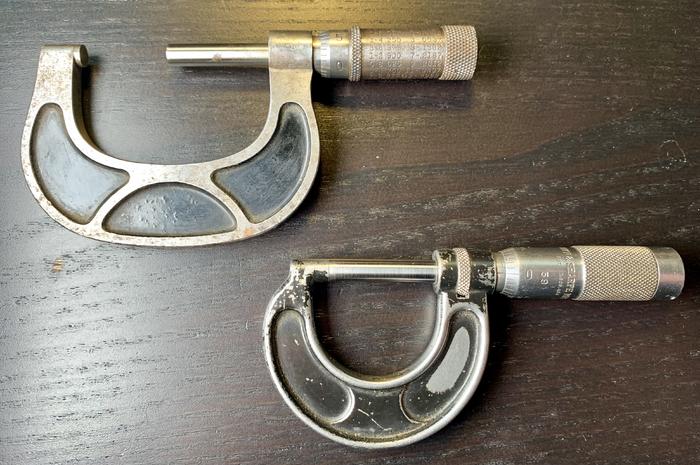Results 91 to 98 of 98
Thread: An idea for a contact grinder.
-
04-20-2019, 06:11 PM #91

I ended up making a new center punch for this setup and it works much better. It can be tapped in with a rubber mallet too, so there's really no danger of deforming it.
Because I'm heat treating with a general purpose propane torch (why haven't I gotten a MAP torch yet?), the HT on the part isn't super even. I don't think the part that gets pounded is particularly hard, but the business end is impervious to a file, so all is well.
Now I wanna make all the parts over again, but better. Having gotten it all to work, I have a much better idea what I'm doing.-Zak Jarvis. Writer. Artist. Bon vivant.
-
05-07-2019, 02:41 AM #92

Had a banner day of Craigslist shopping today. Bought a 1950's toolbox that belonged to a machinist that worked on nuclear submarines. Got a bunch of HSS lathe bits ground to purpose, some end mills, some shaping & polishing stones, a hardened machinist's ruler (that needs some love, it's got a couple bad rust spots), and two micrometers. I've been wanting a quality mike for a few months now.

The larger of the two is a Reed Small Tool Works from the 1920's (from what I can tell). It's a 2"-3" with ten thousandth accuracy -- unfortunately, it's in desperate need of a calibration and cleaning. It currently closes on 33,000ths.
The smaller one is a Brown & Sharpe circa 1950's. There's a calibration sticker from 1970, and it seems to be on the money. I'm very psyched!
Also included was a personal inventory of tools, when they were purchased, how they're identified and how much was paid. It all ranges from 1952 (the toolbox) to 1970. Plus a filled-out procedure test for working on nuclear subs!
There's all SORTS of stuff in there. Ball bearings, pen nibs, grub screws, scraping tools, mysterious carbide insert tooling, precision sawblades, boring bars, blank HSS lathe bits. Dirt. Rust. That 'old machine shop smell'.
I've got on order right now a collet chuck for the lathe because threading parts was starting to drive me completely mad. These power-punch style screw-in dies need to be flipped a couple of times in the lathe and the standard three jaw chuck on my HF lathe is giving me fits matching concentricity. It's really just "open chuck, turn part, roll dice". YOU LOSE, TRY AGAIN. Feh. Three jaw chuck.-Zak Jarvis. Writer. Artist. Bon vivant.
-
05-09-2019, 03:37 PM #93
-
05-09-2019, 04:37 PM #94

It might be a bad assumption on my part, but when the barrel is screwed all the way down it reaches an immediate, firm end. At that point, it reads something like 33,000th's. The system it uses for 10 thousandths is entirely unfamiliar to me, but it stops close to a line between 0 and 5 thou.
-Zak Jarvis. Writer. Artist. Bon vivant.
-
05-10-2019, 02:08 AM #95

Yes, there should be a piece that is exactly 2 inches long that is used for calibration. The only one that does not need one is a 0-1 inch mic, in that case it is screwed all the way down till the anvils touch and then is should read zero. (actually the same is true with the 2-3 only you will turn it down to the calibration piece.)
-
05-10-2019, 02:54 AM #96

A nice set of precision gauge blocks is on my medium-goals list... But in the interim, I checked the 2-3" mike using a digital vernier, and it turns out that it's accurate. I shoulda known the nuclear submarine engineer wouldn't have kept around an inaccurate micrometer!
It can just be screwed down to 0.996 or something like that, instead of 1. There's a scale on the internal barrel and when it's properly zeroed its pretty obvious.
The 10 thou part is still mystifying to me. There are a series of marks above the main indicator and they're all numbered, then the barrel has engraved around it 3 columns of numbers, I guess to look up the full precision based on the extra lines on the inner barrel, but how you read that still doesn't make sense to me and I've been too lazy to look it up. It's accuracy to a 10 thousandth does not appear to be the most practical, but thousandths are perfectly comprehensible.-Zak Jarvis. Writer. Artist. Bon vivant.
-
05-10-2019, 02:41 PM #97

Yeah, in my few years as a tool and die maker i never had to measure down to the 10 thousandths. You have to be a very experienced machinist to be able to maintain accuracy like that (and have some very precise tools to help you do it.)
-
05-10-2019, 07:32 PM #98

My instincts are to eyeball everything. It's gotten me into trouble, and I'm trying to get better about it! Hence, a good micrometer around!
I did at least measure the parts I'm replicating for the Power Punch and write down the measurements on a couple of pieces of brass sheet on my workbench so I have no excuses.
I'd be nice to have a micrometer for threads, but so far I'm happy to be a bad machinist and just use the 'will it screw into my power punch' test. We'll see how that goes as soon as I send some of these parts to someone else to use on a different tool. Should be soon! My new collet chuck oughta be here in the next couple days.-Zak Jarvis. Writer. Artist. Bon vivant.


 318Likes
318Likes LinkBack URL
LinkBack URL About LinkBacks
About LinkBacks







 Reply With Quote
Reply With Quote

